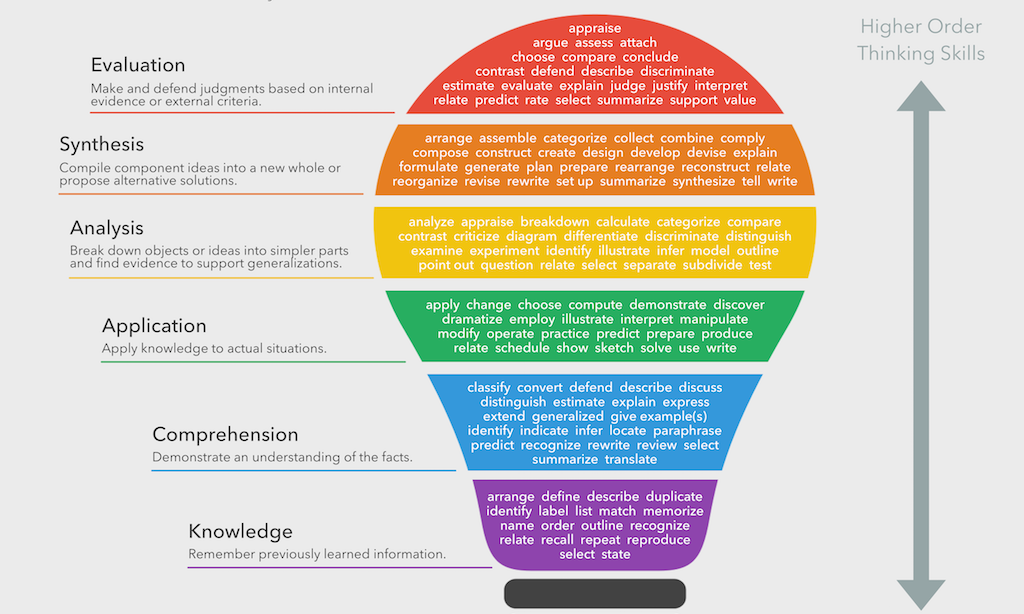“But these are the ones sown on good ground, those who hear the word, accept it, and bear fruit: some thirtyfold, some sixty, and some a hundred.”
Mark 4:20
Early in my education career, one of the topics on which we frequently received professional development was Bloom’s Taxonomy. Terry Heick summarizes, “In one sentence, Bloom’s Taxonomy is a hierarchical ordering of cognitive skills that can, among countless other uses, help teachers teach and students learn.” I believe helping people understand these different levels of thinking within the context of spiritual understanding will help them know whether they will produce fruit for the Kingdom of God. Depending on which level you reach in your ability to think and reason through things, that will be your determination of how much your understanding of God’s Word will impact the world around you. (Spoiler: Fruit-bearing begins at the APPLICATION level.)
(I thought perhaps I would sum up this entire idea in one devotional, but quickly realized y’all don’t probably want to read a 20 page report, so I’m going to cover one level every week until it’s done!)

This week I’m going to unpack the importance (and the dangers) of the fifth level of thinking: SYNTHESIS.
So, last week we discussed ANALYSIS as breaking down objects or ideas so we can really get to the nitty-gritty of the inner parts or workings of a larger thing. SYNTHESIS, inversely, is taking the smaller parts of different things or ideas and compiling them into a new whole. It is being able to take what you have in your hands, and making something amazing out of it. When you open your nearly-empty pantry and accept the challenge of making dinner out of the miscellaneous items you have found (items that might not always logically constitute a typical meal together) you are using SNYTHESIS skills! Your success depends on a number of factors: 1) Your thorough ANALYSIS of the individual items you have and how they might pair together with other things. 2) Your previous APPLICATION of cooking experience such as years of using tried-and-true recipes, and the acquired KNOWLEDGE and COMPREHENSION of learned kitchen practices. Sure, anyone can throw a bunch of stuff in a pan and call it “dinner” but only those chefs on the cooking competition shows can masterfully take a list of completely unrelated food items and craft a beautifully complex, stunning presentation of culinary delight.
The entire Bible itself is a synthesis of narratives, poems, songs, widsom literature and letters written by multiple authors with varying experiences over the course of hundreds of years. You could simply pick a book out of the Bible and read it at face value; or as you begin to dig deeper into the Word you would begin to see that the multi-faceted characteristics of God and His master plan for all of His creation are interwoven within its pages. Without the ability to bring these seemingly diverse books together that way, it is possible to miss the shadows and types of Jesus tucked away, or to miss the emerging patterns that reveal who God is over and over again.
I recommend some time to read the Bible and play your own version of “Where’s Jesus?” and look for representations of Him, especially before His human birth. Or check out Priscilla Shirer’s Character of God in each book of the Bible. This is one part of SYNTHESIS: being able to formulate a bigger picture out of the component ideas. (I also found this link on how to do a Synthetic Bible Study for some tips that I can’t wait to try for myself!)
Another part of SYNTHESIS is creation. Songwriters do this frequently, when they take ideas and craft them into something completely new and original. To bear fruit at this level is to take God’s lead in being a creator ourselves. To use our abilities to make something to honor and glorify Him. People would say that anointed songwriters create praise and worship music that blesses and bears fruit for generations and generations. King David synthesized his musical skills, his understanding of God, and his unique voice. The fruit of his efforts resulted in a majority of the book of Psalms (and of which the lyrics are a source of inspiration for many worship composers today).
One of the dangers of spiritual synthesis is we do not have all the answers or information we’d like to have about God. As much as we have fantastic resources, the exhaustive understanding of who God is we simply do not have access to in this life. 1 Corinthians 13:12 (Berean Literal) states, “For presently we see through a glass in obscurity; but then, face to face. Presently, I know in part; but then I will know fully, even as I have been fully known.” Therefore, as we are trying to synthesize the big picture about who God is, the component ideas we have gathered are incomplete.
Make sure if your goal is to bear good fruit for the Kingdom that you use as the foundation of your synthesized works and ideas the incorruptible seed of the Word of God. Ask the Holy Spirit to be the filter for truth instead of your own thoughts and flesh, as we have the potential to take the perfect truth and put our own spin on it, even ever so slightly. Even a slight variation from the truth creates a trajectory of distance from the original intent. Many spiritual learning materials are a synthesis of what the author has gleaned from the Word, but as the sole source of truth from these is to at best make a copy of an original…there is still the possibility of loss in translation.
Next week will be the conclusion of what has turned into a devotion series and we will conclude with the highest level of thinking EVALUATION!

